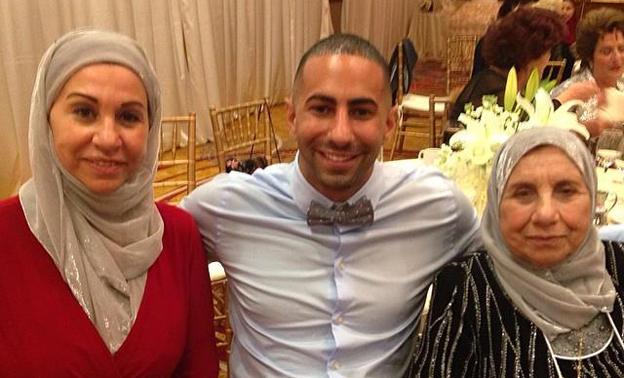#BBCtrending: How FouseyTUBE became a YouTube star
- Published
He has two million subscribers to his YouTube channel, and more than 15 million people have watched his most popular video - the Yoga Pants Prank. In the first of a series of profiles, BBC Trending meets Palestinian-American YouTube star, Yousef Saleh Erakat.
His Facebook profile, external says he's Yousef Saleh Erakat by day and FouseyTUBE by night. That's quite fitting because the super-confident and gregarious man you see on FouseyTUBE's prank videos is shy and awkward once the cameras stop rolling.
"No-one walks around like that 24/7," says Yousef. "You haven't seen who I am when I'm by myself." So who is the real Yousef?
Yousef Saleh Erakat, 24, grew up in California. He was the youngest of four children in a Palestinian-American family.
"Off stage, he's probably the most shy out of all the siblings," says Ahmed Erakat, Yousef's brother, a paediatrician in New York. "There's a big difference between his persona and what he's like in private."
That will come as a surprise to anyone who watches FouseyTUBE, the YouTube channel he set up on 25 March 2011. He's a larger than life character who plays pranks on people. Lots of pranks. Some are just silly and funny. Like, the "dropping people's phone prank, external", where he asks strangers on the street if he can borrow their mobile phones and then pretends to drop them.
Others are more elaborate experiments with a more serious subtext such as the one in which he pretends to harass, external a female friend for wearing a hijab to see how passers-by react.
Yousef showed early signs of becoming an entertainer. "When we were growing up we made home videos and he was the star," says his brother Ahmed.
Yousef's sister Noura, a human right's lawyer and activist, encouraged him to study acting. He studied Theatre at San Jose State University (SJSU).
"He is an extremely focused and personable young man and a hilarious observer of Muslim American life," says David Kahn, chair of television, radio, film and theatre studies at the university.
Yousef began his YouTube career making spoof videos about his family and his Palestinian roots. He quickly gained a strong Middle Eastern fan base.

Yousef Saleh Erakat and family
He has a close relationship with his fans and refers to them as his "family" or "Tubians". "What first attracted me was the Middle Eastern thing," says Noonii, a 15-year-old Fousey fan from Arizona, who wears her Tubian T-shirt with pride. "I'm Middle Eastern, too, and I was, like, mad respect to someone who puts themselves out there. I thought that was really cool."
"I like FouseyTUBE because I can relate to him and what he's trying to do," says another Tubian, Tala Khalaf. "He's bringing a better image to the Muslim Arab stereotype. You don't often see many positive Arab or Muslim public figures."
Yousef's a major contributor to the Palestinian Film Festival in the US and many of his videos explore his cultural identity. But he has faced criticism from some Palestinians who would like his work to be even more political. "I know where I'm from. But that doesn't mean it can't just be entertainment," says Yousef. "What's wrong with having a Palestinian entertainer with two million-plus followers on YouTube? That's big in itself."
Although he describes himself as an entertainer, he has a drive to make videos with an underlying moral message. The activist in Yousef was present long before the days of FouseyTUBE. "He's always been the guy rooting for the underdog and he always had a bigger message," says his brother Ahmed. "He just has more people to listen to him now."
Conducting non-scientific social experiments is a big part of the FouseyTUBE channel. For example, in The Kidnapping Children Experiment, external a child actor pretends to have been abducted and approaches strangers seeking help. The video has been viewed more than five million times and draws on Yousef's own childhood fears of being kidnapped.
Similarly, The Bullying Experiment, external puts members of the public to the test by seeing who will intervene when a young man is openly subjected to intimidation.
"The experiments have been discussed by college classes," says Ali Baluch, Yousef's producer and cameraman. "People take screenshots of their professor playing the videos in class and send them to us."
Yousef's videos are not quite experiments in the scientific sense, says Raymond Duch, an expert in experimental social sciences at Oxford University. But he says they are "thought-provoking" and could quite easily be tweaked to be made more scientific.
As Yousef's videos continued to grow in popularity, he began to make the transition into mainstream entertainment. In 2012, he was selected to appear on the Ellen Show for a segment called the Dance Dare where the host Ellen de Generes asks her viewers to film themselves dancing behind people who don't know.
But his biggest success on YouTube so far has been The Yoga Pants Prank, external. Since it was posted to YouTube in March 2014, it's been watched more than 15 million times.
"I was at the gym and I noticed that every girl in pants got stared at," says Yousef. "So I thought why not put pants on and test it out?" And so Yousef donned a pair of yoga pants, concealed his face and caught men off guard staring at his bottom.

Yousef recently launched another YouTube channel DOSEofFOUSEY, external which has over 85,000 subscribers. It's the home for his new reality series of vlogs, Reign of Simba, external, which gives an insight into Yousef as opposed to his alter ego Fousey.
"I've had a lot of comments from people not liking the videos. It never affected me like it did on Reign of Simba," says Yousef. "Someone said, 'I love what you're doing but it might be too soon to introduce to your viewers'. Because a lot of people want to see entertainment and don't understand that most comedians are depressed."
Coping with the attention online has taken its toll. Last month Yousef deleted all of his tweets and was considering leaving Twitter. "I have my own struggles that I don't know how to deal with in public and sometimes I lash out and do it wrong," he says. "But that time I deleted my tweets, it felt like the right time."
Like any entertainer Yousef showcases his extrovert side online. His Instagram, external page is filled with shirtless selfies and promotional videos. He defends accusations of narcissism by explaining his mindset.
"I hate Instagram. It's all about how I look and if I'm hot I get a lot of likes. It's a joke to me. I'm trolling the world by doing it. It's not for any other reason. I play the game to change the game. But I hate doing that. I hate myself for posting a shirtless selfie each time I do it."
Reporting by Anne-Marie Tomchak , external
More on Yousef Saleh Erakat on BBC Trending radio. Listen to the programme here, or subscribe to the BBC Trending podcast. BBC Trending airs on BBC World Service every Saturday at 10:30 GMT.
You can follow us on Twitter @BBCtrending, external